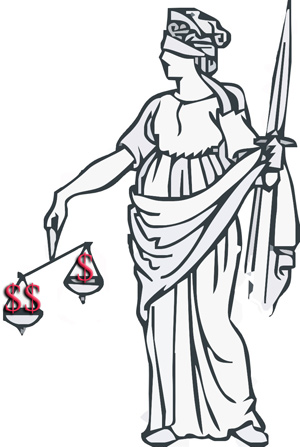The Stoneslide Corrective has learned of a new plan devised by several business-friendly advocacy groups in California to construct a more efficient court system. But first a little background.
 As reported in the San Francisco Chronicle by Bob Egelko, California judges are proposing doing away with trial by a jury of twelve in misdemeanor cases. The judges propose that, for misdemeanors, juries be limited to eight people. They have also called for other sweeping changes, including cuts to the number of challenges prosecution and defense attorneys can make against prospective jurors, all in order to save money.
As reported in the San Francisco Chronicle by Bob Egelko, California judges are proposing doing away with trial by a jury of twelve in misdemeanor cases. The judges propose that, for misdemeanors, juries be limited to eight people. They have also called for other sweeping changes, including cuts to the number of challenges prosecution and defense attorneys can make against prospective jurors, all in order to save money.
And now, the new plan from an alliance of California Republicans and the Democratic Business Council, a group dedicated to making the Democratic Party friendlier to business, calls for America’s courts to be privatized, saving local, state, and federal governments vast amounts of money. They say that, given its budget woes, California would be the perfect site for a pilot program.
In the proposed system, which is laid out in a white paper, “Fixing Justice: A Sustainable, Private-Sector Remedy for Court System Malaise,” instead of relying on tax dollars, California courts would be fully paid for by businesses. Any business registered with the California Secretary of State could put out bids to fund a court or courts. These “B-courts” will have full judicial authority, including the power to issue warrants and subpoenas, declare guilt or innocence, and hand down sentences. The paper estimates the savings to the people of the state will be more than $3 billion.
Under the plan, defendants will be able to choose their preferred, private B-court based on cost, convenience, and quality. Some B-courts will provide top-end services and amenities, such as commemorative photo mugs. Others will be value-focused.
Terwilliger Gregory Stocke, co-author of the report, says the coalition wants people to know “this isn’t an assault on the California judiciary. California has the hardest-working judges in the country. But the private sector can deliver justice much more efficiently than our pork-addicted government.”
The plan’s proponents say they anticipate concerns about injustice from “the civil liberties crew,” but that these concerns are misguided. “Moving the administration of justice into private markets will only make justice better, in numerous ways,” says Stocke. He argues that competition between court systems for cases will create an incentive for each court to run fairly, efficiently, and swiftly. Furthermore, any judge or lawyer who acts inappropriately risks being found culpable by a rival court, so all courts will be kept on the straight and narrow due to threat of retaliation.
The current system is dying, the coalition members say. “What could be more unfair than leaving people to languish in our terminally ill court system?” asks another co-author, Findley Jones. “Public defenders embody just one aspect of the inefficiency of the whole scheme of government-funded justice,” Jones says. “Defendants should be invested in their defense. How can they be if it’s given to them for free?”
Jones says that they are not abandoning the middle class or the poor. “There will still be public defenders. But in our fairer system, people will take out loans, at reasonable interest rates, to pay for them. For once, the underclass can truly participate in justice being dispensed.”
Bryce Smith, a Democrat and one of the authors of the white paper, says small claims courts and other civil jurisdictions would accept bids from businesses when lawsuits or other civil actions are begun. “If, say, Company X were being sued because some of its equipment allegedly leaked hazardous chemicals into the air or water, and people were sickened, with some of them dying, a new and improved court, instead of just inefficiently taking any old judge, would have one who’s a real expert, one who likely already works for Company X,” Smith says.
The white paper also presents an economic forecast showing that the new court system will drive a 10 percent annual increase in economic activity in the state. In addition to the benefits of lower taxes, the study’s authors anticipate that obstructive regulations will be reduced, and that the formation of private courts and the bidding for jurisdiction will produce financial innovation. Private equity and venture capital funds will flow into the state.
Mortimer Fuckledunch, a Tea Party member who has seen the white paper but says he has not had time to read it, calls it a great idea. “We all know that what you get for free is just crap. Justice can’t be free any longer. This is America—justice should be bought and paid for.”


